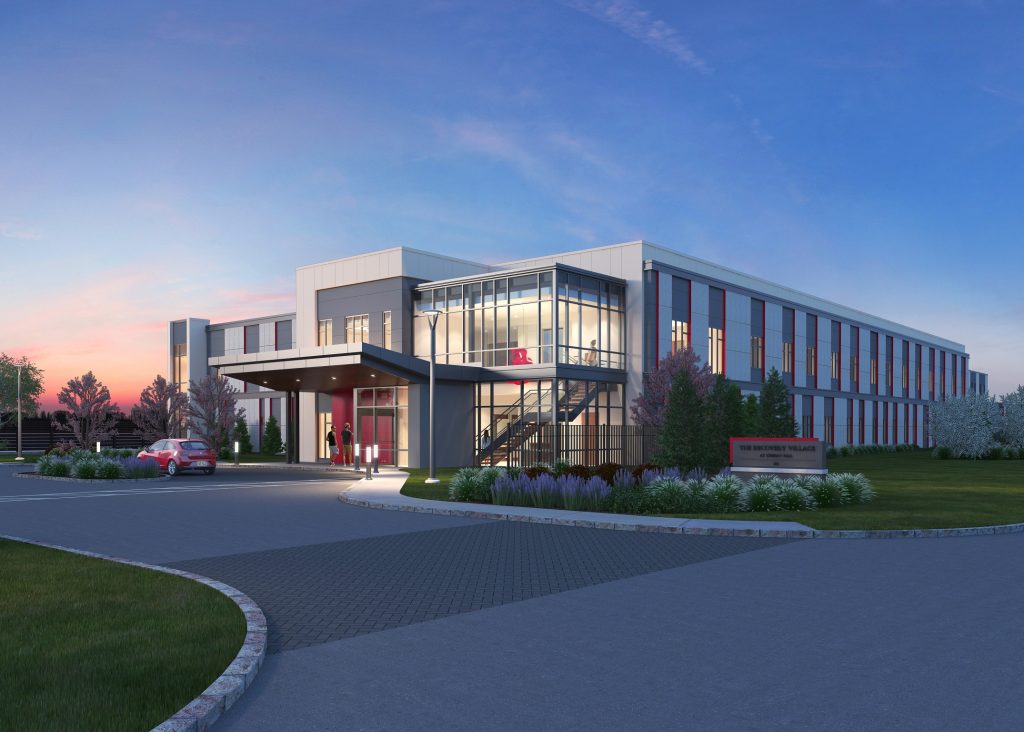
ARRIVAL
Checking In to Inpatient Rehab
When you call, admission times are scheduled to ensure each person gets the full attention of our care team upon arrival. A late arrival may cause a wait time.
Each resident must consent to a search of their person and belongings upon arrival to ensure the safety and sobriety of all patients. During this search, staff members will collect any items not permitted during treatment and store them safely and securely until you finish your stay. Additional random searches may be conducted throughout your time at The Recovery Village Cherry Hill at Cooper.

Our Treatment Process
Patients at The Recovery Village Cherry Hill at Cooper begin in a treatment program that best suits their needs, then may step down to lower care levels as they progress through their plan. Treatment often begins with a medical detox, followed by inpatient or intensive outpatient care.
ABOUT YOUR STAY
Length of Stay
How long you stay may depend on your program, customized treatment plan, recovery progress and insurance coverage. In general, clients may receive:
- Medical detox for 5–7 days
- Inpatient care, including medical detox for 14–28 days
- Total stay including PHP and IOP care is 35–60 days
Will I be forced to stay in treatment?
We encourage all patients to finish their treatment plan entirely, as leaving medical care too soon can lead to relapse and overdose. However, patients can choose to leave rehab at any time, even against medical advice, as long as they are not a danger to themselves or others.
Living at the Facility
Once you’ve decided to start treatment at The Recovery Village Cherry Hill at Cooper, it’s time to plan your stay.
What to Pack
This packing guide ensures you have everything you may need while you’re with us, so you can focus on what’s really important — healing.
Travel Arrangements
Wherever you’re coming from, our Recovery Advocates ensure you arrive at our facility safely and on time. You can plan your travel independently, or we can help schedule arrangements with you. We can also arrange pick-up to and from the airport, bus stations or train stations.
Sleeping Arrangements
Rooms at The Recovery Village Cherry Hill at Cooper offer a comfortable resting place for your recovery. They are shared with one other client, which can foster critical fellowship during a challenging time. Each room has a sink and an adjoining bathroom. The number of residents in each room may depend on your treatment stage and care needs.
Food & Nutrition
Our facility features a full cafeteria with meals our onsite chef prepares. Typically, a few different meals will be provided for breakfast, lunch and dinner. Each delicious and nutritious meal is designed to bolster clients’ physical and mental health as they heal. Snacks are also provided. No outside snacks or meals are permitted in the facility. Please let us know if you have any food allergies or dietary needs so we can accommodate you.
Housekeeping & Laundry
Clients are responsible for cleaning and doing their laundry to nurture independence and accountability. Certain housekeeping services are provided, like changing linens.
Phone Policy
Cell phones are securely stored upon arrival for the safety and privacy of all clients. A safety call upon arrival is allowed. Storing cell phones helps clients focus on healing by avoiding distractions and keeping their stay confidential. Following 72 hours without calls, clients may use their cell phones for a maximum of 1.5 hours daily with their clinician. Cell phones are returned upon entering the PHP and IOP levels of care for limited use.
Smoking Policy
Residents at The Recovery Village Cherry Hill at Cooper may take designated smoke breaks periodically. Your treatment plan determines the timing and frequency of these breaks. If you smoke, you must bring enough unopened cigarettes or tobacco products for your entire stay. Vapes are allowed but must be disposable and labeled as Pure Nicotine with no additional additives. All smoke, tobacco, and vape products must be new and unopened upon arrival at the facility. Products may be offered during your treatment to help you quit smoking. Please note: patients under 21 will not be able to purchase tobacco products during their stay. Our staff cannot provide or buy tobacco products for patients under 21.
Family Visits & Therapy
Rebuilding relationships with loved ones is important during treatment. Some may benefit from long-distance or virtual family visits, while others may need in-person visits. Family engagement sessions are generally provided as clinically appropriate.
Offsite Visits
While treatment occurs at our Cherry Hill facility, offsite opportunities may be available, including additional support group meetings and recreational therapies. Your level of care and medical needs determine your eligibility for offsite visits.

OUTPATIENT CARE
Attending Outpatient Rehab
If you’re starting treatment in online outpatient care, you’ll receive a few emails from us. They will ask you to complete electronic treatment consent forms, and confirm your upcoming appointment(s).
Ask Our Recovery Advocates
Our Recovery Advocates can answer your questions about our addiction treatment programs and life at The Recovery Village Cherry Hill at Cooper.
Call 856-890-9449 to speak with an advocate now.
PAYING FOR TREATMENT
Insurance and Your Obligation During Treatment
Most health insurance plans require you to pay out-of-pocket costs to access your healthcare benefits (collectively known as the “Patient Responsibility”). Your individual Patient Responsibilities will differ.
An intake coordinator will discuss your Patient Responsibility with you when you’re admitted or as soon as you are medically stable. They will explain the deductible due during admission and that the co-insurance amount and out-of-pocket cost will be billed and paid for once services are complete. Onsite financial counselors will review your financial responsibility again during treatment with case managers who can help you navigate FMLA and short-term disability.
You are responsible for checking with your insurance provider before admittance at The Recovery Village Cherry Hill at Cooper to ensure you understand your benefits plan. Please note your insurance policy may not be a “participating provider” with The Recovery Village Cherry Hill at Cooper. You are responsible for all non-covered and out-of-pocket costs related to your treatment stay.

Your Privacy Is Important to Us
The Recovery Village Cherry Hill at Cooper recognizes your right to privacy. We hold each person’s confidentiality in the highest regard.
Upon arrival at The Recovery Village Cherry Hill at Cooper, each patient can complete all required information releases, allowing staff to discuss important details with necessary others for continuity of care. No information will be disclosed to any party without the patient’s prior written consent, following all HIPAA guidelines and requirements.

COVID-19 Notice
The Recovery Village Cherry Hill at Cooper is taking proactive steps to ensure the health and safety of all patients, employees and the communities we serve. We are following the latest CDC guidelines for controlling the spread of COVID-19, including testing, face masks and enhanced sanitation protocols.
Ready to start your recovery journey?
We’re available to answer questions, verify your insurance benefits and schedule customized treatment that works for you.



 Insurance
Insurance About Us
About Us Our Facility
Our Facility Admissions
Admissions Programs
Programs Medical Detox
Medical Detox Inpatient Rehab
Inpatient Rehab Aftercare & Recovery
Aftercare & Recovery